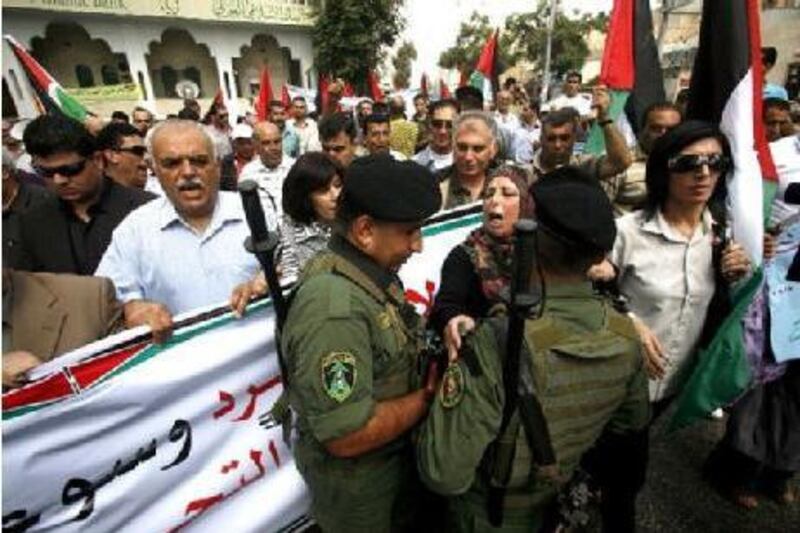TEL AVIV // The Palestinian leader Mahmoud Abbas met George Mitchell, the US Middle East peace envoy, yesterday to discuss a Palestinian threat to leave peace talks with Israel unless it extends a moratorium on West Bank settlement construction.
An Abbas aide confirmed the meeting in New York. Mr Abbas had also been expected to meet Hillary Clinton, the US secretary of state, but her spokesman said not to expect a meeting yesterday. P J Crowley said the United States was "in touch with the Israelis as well". Amid frantic diplomatic efforts to persuade the Palestinians not to leave the negotiations, Mr Abbas in a speech at the United Nations yesterday condemned "the mentality of expansion and domination" that he said controls Israel's policies.
Mr Abbas has threatened to quit the negotiations unless Israel extends a moratorium that is due to expire at midnight tonight. Contacts went on behind the scenes yesterday, and even Barack Obama, the US president, was available to make calls if necessary, officials said. Israel's defence minister, Ehud Barak, and Yitzhak Molcho, the lawyer who is the Israeli prime minister Benjamin Netanyahu's point man on the talks, were in New York to aid efforts towards a compromise, Israeli radio said.
The Israeli government has rejected strong international calls, including from Mr Obama, to completely halt settlement construction. But the reluctance of the main parties in the talks to leave the negotiation table could lead to a compromise. Analysts say the settlement issue will probably not derail the US-backed direct peace negotiations, which started this month between Mr Netanyahu and Mr Abbas.
Talks last week in Damascus between Fatah, Mr Abbas's party, and Hamas, which rules in the Gaza Strip, might bolster the negotiations with Israel. They may enable Mr Abbas to keep his supporters satisfied because talks with Hamas indicate that the Palestinians can mount a united front in discussions with Israel. Meanwhile, Danny Danon, a pro-settler legislator in Mr Netanyahu's Likud Party, said yesterday that settlers have already moved equipment into the Revava settlement deep in the West Bank.
He said activists would lay the cornerstone for a new neighbourhood today, the last day of the slowdown. Settlers plan additional construction tomorrow after the restrictions formally end. Nawaf Souf, the Palestinian deputy governor in the area, said settlers have moved construction equipment and 20 to 30 mobile homes into Revava in recent days. "The moment that the freeze is lifted, they will do the work openly," he said.
Mrs Clinton held a 25-minute meeting with Mr Abbas late on Friday. Furthermore, she spoke with Mr Barak earlier in the week. Mrs Clinton has also met other Middle Eastern leaders on the sidelines of the UN General Assembly meeting in New York in the past few days. P J Crowley, the State Department spokesman, said the US was continuing its efforts to avert a breakdown in talks. "It is a pretty intense set of negotiations going on right now with the Israelis and the Palestinians," Jeffrey Feltman, the assistant secretary of state for Near Eastern affairs, said. "We know that time is short. This is an important issue."
Mr Feltman added that Washington was pushing Israel to extend the moratorium and was making it clear to the Palestinians that it is not in "their interest to walk out of the talks". Analysts said they doubt the negotiations will stop. "I don't see the talks collapsing," said Mahdi Abdul Hadi, the director of the Jerusalem-based Palestinian Academic Society for the Study of International Affairs. He said that in a worst-case scenerio, there could be a short lull in negotiations. "Both Netanyahu and Abbas want the talks for their own separate interests, and therefore they need to keep this peace process alive."
No details have been disclosed on what a compromise would entail. Analysts say a likely middle ground would be for Israel to continue building homes in the larger settlement blocs that it plans to keep under a peace pacts while mostly curbing building elsewhere. Such a proposal has been raised by some of Mr Netanyahu's more centrist allies and so far he has not dismissed it. Mr Netanyahu needs the talks to maintain Israel's relationship with the United States, analysts said. He also wants to forge closer security ties with Arab countries, possibly helping him build a stronger regional front against Iran.
Israel, facing growing condemnation from key allies over its approach to the Palestinians, also appears to be open to a compromise that would prevent international isolation. The US and European Union have urged Israel to extend the moratorium. "If no magic solution is found … Israel may find itself in isolation, a diplomatic blockade and a confrontation with its allies on the only issue that no one is interested in hearing what it has to say - settlements," wrote Yossi Verter, a senior commentator for the newspaper Haaretz.
Mainly because of US pressure, the Palestinians will probably stay at the negotiating table. But analysts say Mr Abbas also wants to keep his position as the key Palestinian partner for Israel, a role that he hopes may also help Fatah gain domestic political strength over Hamas. The settlement issue has gained prominence over all other disputes in the decades-old conflict - including the borders of a Palestinian state, Jerusalem and the fate of Palestinian refugees -largely because of the approaching deadline. About 300,000 Jewish settlers live in West Bank communities, with a further 200,000 residing in East Jerusalem, which Palestinians want as the capital of their future state.
foreign.desk@thenational.ae





